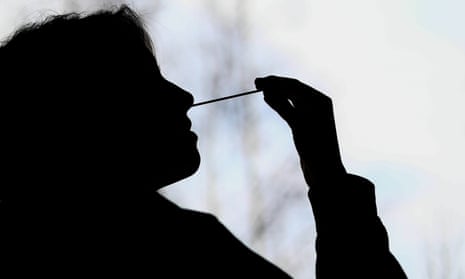Australia’s medical regulator has sounded the alarm on companies allegedly trying to bring unapproved rapid antigen tests into Australia, with federal police investigating claims one firm forged the authorisation of health minister Greg Hunt on forms.
Many millions of rapid tests are due to arrive in Australia in coming weeks to fulfil large orders placed by state and federal governments. But local supply in Australia is patchy at best, with chemists saying supply is not keeping up with the huge demand for rapid tests among citizens, businesses and community groups.
“The Therapeutic Goods Administration in collaboration with the Australian Federal Police are investigating false documentation allegedly used to support the illegal importation and supply of unapproved rapid antigen tests for Covid-19,” the TGA said in a statement on Friday.
“The letter, claimed to have been issued by minister Hunt, appears to provide a NSW based company with an exemption from the requirement to include their product in the Australian Register of Therapeutic Goods prior to importation and supply in Australia.
“No special exemptions to import or supply unapproved rapid antigen tests have been granted by the TGA.”
It is unclear if any of the unapproved rapid tests have made it into Australia, or have been offered for sale. The TGA did not name the company it says is under investigation.
In a statement to Guardian Australia, a spokesperson for Hunt said it was now a matter for police.
“All rapid antigen tests must be approved by the TGA for use in Australia,” the spokesperson said.
Guardian Australia has contacted the TGA for comment. In a statement, an AFP spokesperson said police were investigating.
“The AFP can confirm it has received a report from the Therapeutic Goods Administration containing allegations that false documentation was used to support the illegal importation and supply of unapproved rapid antigen tests,” the spokesperson said.
“AFP inquiries into the matter are ongoing.”
Australian regulators have approved 23 self-tests for at-home use, the majority imported from China, the US, Germany, Singapore and South Korea. Tests can only legally be sold in Australia if they have been approved for inclusion on the Register of Therapeutic Goods, the TGA said.
Last week TGA boss, Prof John Skerritt, said the TGA was monitoring unapproved imports of rapid tests, and regulators were dealing with “a lot of false claims” from suppliers.
“We have had a lot of trouble with companies making false claims,” he said at a press conference alongside Hunt in Canberra.
“The police are looking into this so I won’t comment further in any detail. We’ve had comments, we’ve had issues of falsified letters of approval that companies can say: ‘Look here, I’ve got the letter saying that this product is approved by the TGA’, and it’s an out and out forgery.
“So unfortunately, while we’ve got a lot of companies doing some really good work, getting product out there into the supply chains, there are some who clearly are doing the wrong thing.”
The Australian Competition and Consumer Commission said it was investigating reports of price gouging in the sale of rapid tests, claiming to have received allegations some small outlets were selling a single kit for more than $70. The AFP announced last week it too was looking at price gouging, with two investigations in Queensland and New South Wales.
Police warned individuals and businesses could face up to five years in jail for selling rapid tests for more than 20% over the original purchase price.
In a press conference on Friday, Hunt said 2,300 pharmacies were participating in the government’s new program for concessional access to rapid antigen tests, which had delivered 1.67m tests to 380,000 people on pensions, low incomes or healthcare cards.
